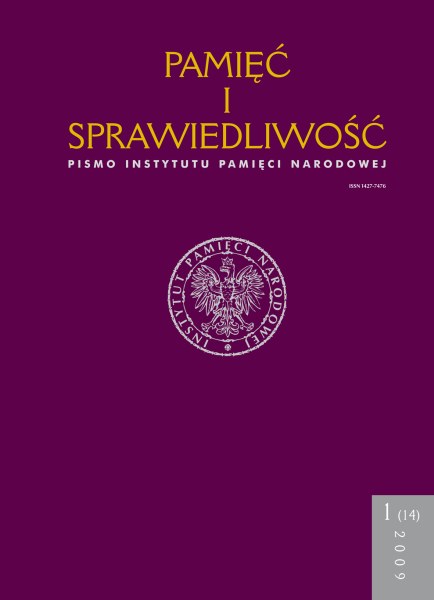Życie pod lupą bezpieki. Działania aparatu bezpieczeństwa wobec Edwarda Serwańskiego
Pamięć i Sprawiedliwość, V. 14 N. 1 (2009), pages: 357-377
Publication date: 2009-12-30
Abstract
Edward Serwański (1912–2000), lawyer, historian, writer, civil and scouting activist, scholar at the Western Institute (Instytut Zachodni) in Poznań was being observed by the security services for over 30 years. Existing documents about Serwański cover the period from March 1946 to March 1977.
During the 1939–1945 occupation, he was a member of the “Ojczyzna” (“Fatherland”) organisation originating from the nationalist movement. The organisation played an important role in building secret state administration structures and ZWZ-AK (Związek Walki Zbrojnej-Armia Krajowa – Union of Armed
Struggle-Home Army), in particular in Wielkopolska. Its main forms of activity included secret education, charity, information and propaganda operations, as well as preparation for the seizure of territories stretching to the Odra and Nysa Łużycka
rivers by Poland. In July 1945 “Ojczyzna” was dissolved. Many of its members started to work in institutions established in the so-called Regained Territories (Ziemie Odzyskane), in particular in the Ministry of Regained Territories, Polish Western Association (Polski Związek Zachodni) and the Western Institute (Instytut Zachodni).
In the second half of 1947 the security services started an operation against the members of “Ojczyzna” under the code name “Alfa”. In the period 1947–1950, a number of the organisation’s activists were arrested and sentenced. Serwański,
detained on 20 March 1948 upon refusal to cooperate with security services, was arrested and subjected to a brutal interrogation. On 29 August 1950 the Military Regional Court in Warsaw sentenced him to 7 years’ imprisonment (3.5 years
after amnesty was announced).
Upon his release from prison, Serwański returned to work at the Western Institute. He cooperated with the institute until 1993. In 1960 he obtained a PhD degree, and in 1971 a habilitation degree. His scholarly works and journalism include over 200 publications. In December 1976 the security services in Poznań
objected to granting him the title of extraordinary professor. He received it only in 1981 in the time of the Solidarity movement when he was 70 years old.
Serwański’s studies on the history of the underground organisations in Wielkopolska, from which came, among others, the book Wielkopolska w cieniu swastyki (“Wielkopolska Under the Shadow of the Swastika”) published in 1970 (after an 11-year long battle with censorship), were used by security services as
a pretext to escalate the observation. The objective was to seize full control of Serwański’s scientifi c and educational work, as well as his contacts with combatants’ community. At the end of 1976 it was planned to undertake “special” actions intended to discredit Serwański as a scholar and to damage his reputation
among colleagues and friends. Respective documents were not preserved.
Puoi leggere altri articoli dello stesso autore/i
- Aleksandra Pietrowicz, W oczach wroga… Kobieta polska w opinii Niemców w latach wojny 1939–1945 – dwa przykłady , Pamięć i Sprawiedliwość: V. 26 N. 2 (2015)
- Aleksandra Pietrowicz, Sekcja Zachodnia Departamentu Informacji i Prasy Delegatury Rządu RP – zarys struktury organizacyjnej i działalności (wrzesień 1942–lipiec 1944 r.) , Pamięć i Sprawiedliwość: V. 8 N. 2 (2005)
 Język Polski
Język Polski
 English
English
 Deutsch
Deutsch
 Français (France)
Français (France)
 Italiano
Italiano
 Русский
Русский


 PDF (Język Polski)
PDF (Język Polski)
